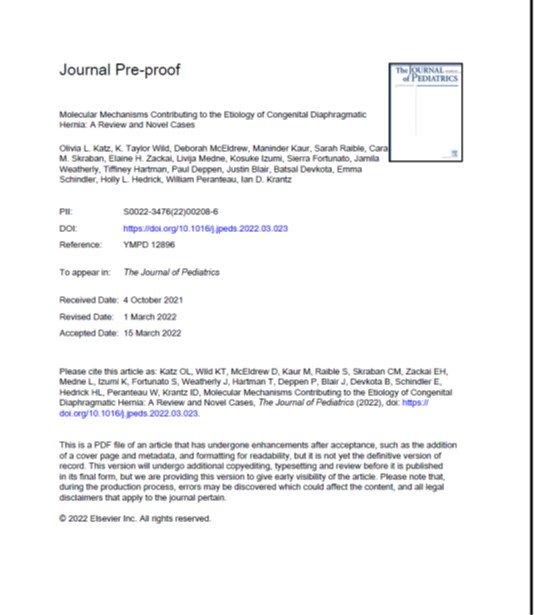Fore Hadley & Children’s Hospital of Philadelphia
In 2020 with primary support Locumtenens.com the Fore Hadley Foundation engaged with the team at Children’s Hospital of Philadelphia to assist in their ongoing search for genetic markers that may help identify instances of non-syndromic (isolated) congenital diaphragmatic hernia - in other words, cases where other genetic abnormalities like Cornelia de Lange Syndrome (CdLS) and Pallister Killian Syndrome (PKS) are not present.
Funds from Fore Hadley went primarily towards the provisioning of Genomic Sequencing (DNA) for ~ 25 tissue samples and assisted in the requisition of the necessary tissue procurement and processing on which testing could be done.
Breakdown of the Genomic Sequencing Study:
25 Human DNA Samples over the course of 2 years
$1,500/sample for DNA Sequencing
$600/sample for RNA Sequencing
Summarized Findings:
The research team at CHOP identified two novel genes - STAG2 and MED14 - they believe may have substantial impact on the presentation of isolated cases of congenital diaphragmatic hernia. Neither of these genes had previously been noted or understood to have an impact on CDH, however through this initial research and subsequently the paper below being published in The Journal of Pediatrics they plan to expand their study via grant applications to the likes of the National Institutes of Health (NIH) to further study these genes. In their own words:
Identifying an underlying genetic etiology of CDH helps to alleviate feelings of parental guilt facilitates more accurate counseling about prognosis, as well as recurrence risks, both for the family in future pregnancies, and eventual transmission risk for the patient (something that will be of particular importance as more and more children with CDH are surviving to adulthood and reproducing), improves understanding of the pathophysiology of CDH and possible genotype-phenotype correlations and leads to opportunities for developing novel therapeutic approaches, which will likely be gene and variant specific. This is important in the era of fetal interventions such as gene editing; the ability to target aberrant genes during development to facilitate proper diaphragm formation could have far reaching benefits on a fetus found to have CDH at an early point in pregnancy.



